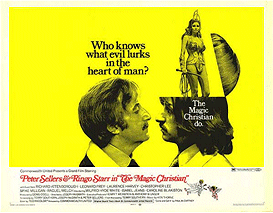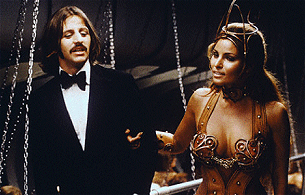Sixties
City presents
a wide-ranging series of
articles on all aspects of the Sixties, penned by the creator of the iconic
60s music paper Mersey
Beat
|
Sixties
City presents
a wide-ranging series of
articles on all aspects of the Sixties, penned by the creator of the iconic
60s music paper Mersey
Beat
|
|||||
|
| Ringo Starr’s
first feature film ‘Candy’ was based on a novel
by Terry Southern, who was also the author of ‘The Magic Christian’ on which
Ringo’s second solo movie was based (no wonder his ‘Goodnight Vienna’ album
had the phrase ‘buy a Terry Southern book’ among its sleeve notes). Ringo
had only appeared for about ten minutes in ‘Candy’, but he was given a co-starring
role with Peter Sellers in this 95-minute British movie. It was filmed in colour and released in 1969 with an 'A' certificate in the UK. The director was Joseph McGrath and the producer was Denis O’Dell. Terry Southern, O’Dell and Sellers wrote the screenplay based on Southern’s book. The film’s score was by Ken Thorne, while the theme song ‘Come And Get It’ was written by Paul McCartney and performed by the Apple band Badfinger. Thunderclap Newman provided ‘Something In The Air’ and other songs featured in the film were ‘Rock Of Ages’ and Noel Coward’s ‘Mad About The Boy.’ Peter Sellers appeared as Sir Guy Grand, Ringo played Youngman Grand, Wilfred Hyde White was the ship’s captain and Patrick Cargill an auctioneer. The 'guest stars' in the movie were Richard Attenborough, Leonard Frey, Laurence Harvey, Christopher Lee, Spike Milligan, Roman Polanski and Raquel Welch. Although one reviewer wrote, “Ringo Starr continues to exploit the melancholy wanderer’s role he made his own in ‘A Hard Day’s Night’”, Ringo didn’t really have much to get his teeth into. His part had been specially written for the film (the character he played wasn’t in the original book) and his role was mainly that of an observer, watching the various stunts which Sellers sets up. Ringo appears as Youngman Grand, the adopted son of the world’s richest man, Sir Guy Grand. Sir Guy resolves to show Youngman the extent to which people are obsessed with money and the ends they will go to obtain it. He seeks to prove that ‘everyone has his price’. |
 |
 |
The lure
of money encourages a traffic warden (Spike Milligan) to eat his own ticket
and causes a snobby art gallery official (John Cleese) to sell him a Rembrandt.
Before the man’s horrified eyes, Sir Guy cuts out the nose in the painting,
stating that he only collects Rembrandt’s noses. He bribes the Oxford crew
to lose the annual boat race against Cambridge and entices two beefy boxers
to embrace each other in the ring during a bout. Money also persuades a famous Shakespearean actor (Laurence Harvey) to do a strip tease in the middle of his soliloquy in ‘Hamlet.’ Sir Guy then takes Youngman on a cruise on the liner ‘Magic Christian’ where his education into man’s greed continues. At one point a whip-wielding Raquel Welch shows him over the engine room of the ship, to discover that it is in fact a galley with topless females at the oars. The grand finale of the film occurs back on dry land in London where a giant vat has been filled with the most unspeakable detritus, including vomit, human excreta and pig’s blood. Sprinkling it with money, Sir Guy stands back and watches as respectable businessmen brawl amid the unsightly mess. In her review in ‘Films & Filming’, Margaret Tarratt commented, “The surreal world of the Goons and the picaresque fantasy world of the Beatles are combined in an essential genial indictment of British capitalist society”. The film received its Royal World Premiere on December 12th 1968 at the Odeon, Kensington, in the presence of Princess Margaret. During the filming, Ringo and Peter Sellers became friends and they co-hosted a party at Les Ambassadeurs, a fashionable club in Hamilton Place, London. Ringo also bought Sellers’ house, Brookfields, from him. |
|
Article
Text
UK
web hosting by
|